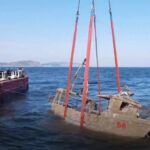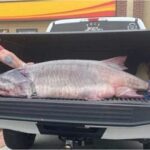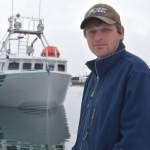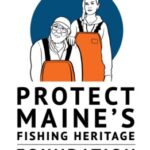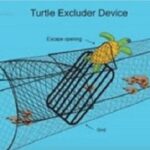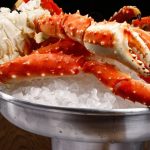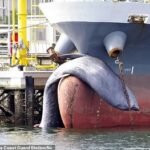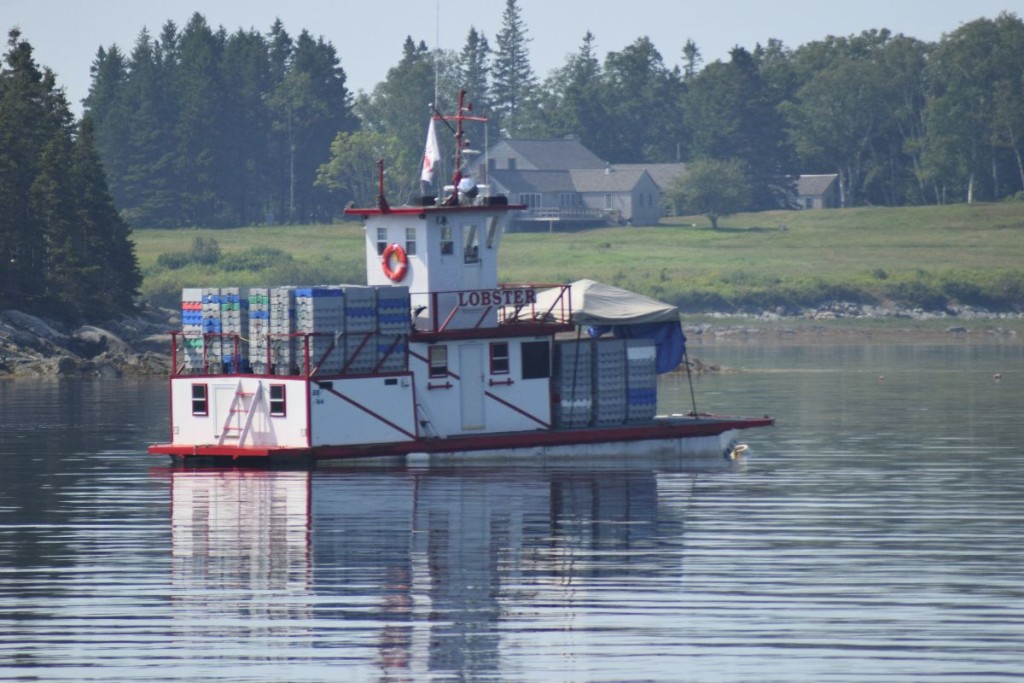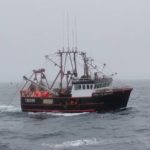Daily Archives: December 30, 2016
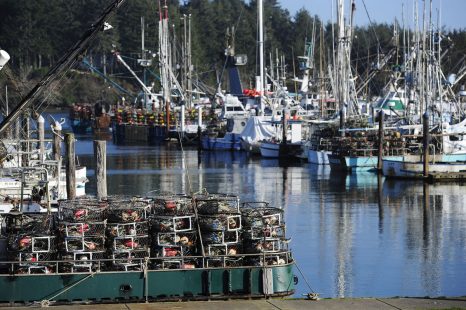
STRIKE!!! – Commercial crabbers strike on West coast
Commercial fisherman from Morro Bay, California, all the way to the Canadian border have gone on strike. Crab pots are piled on boats still tied up in the harbors all along the West coast because Bandon Pacific and other wholesale buyers want to pay 25 cents less than the negotiated price to fishermen on the southern Oregon cost. “This is all over a quarter,” said Charleston fisherman Jim Thornsberry. “Thousands of people are out of work because processors don’t want to pay us what they are already paying fishermen in California.” John Corbin, fisherman out of Columbia River and the chairman of the Dungeness Crab Commission, explained that $3 per pound was the negotiated price prior to the Brookings and Port Orford crab opening. “But then the processors dropped their price on Monday and we went back to the negotiation table, but they drew a line in the sand at $2.75,,, Corbin said there is usually solidarity among fishermen, and is glad “we are all tied up together.” Read the story here 19:11 Crab Fishermen in West Coast Ports Pull Pots in Solidarity with Humboldt Read the story here 20:35
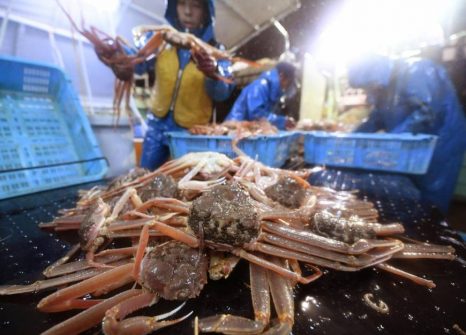
Japan sees crab prices surge as poached Russian imports sink
Prices of crab, a sought-after delicacy in the year-end and New Year’s period, are surging because of a sharp fall in imports, especially from Russia and Alaska. Imports provide most of the crab distributed in Japan, and wholesale prices are some 30 to 50 percent higher than a year ago. Imports of red king crab, a popular variety, came to about 4,270 tons from January to November, less than half the annual record set in 2012. “This year’s red king crab imports could be on par with the level in 2015, which was the lowest in recent years,” said an official of a major fisheries company. Imports of snow crab, another popular species, have also been falling recently, industry officials said. Crab from Russia has been dwindling due to tighter regulations on poaching and illegal exports that began about two years ago. Before that, more than 50 percent of Russian crab distributed in Japan was poached, the fisheries company official said. Ports in Hokkaido that used to be busy handling crab from Russia are now quiet. Read the story here 16:50
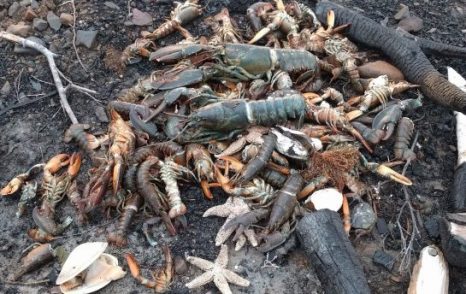
DFO says nothing out of the ordinary with the environment where sea creatures washed up dead
The distressing amount of sea life and diversity of species found dead on some beaches along the Bay of Fundy over the past few weeks has been puzzling. So far, tests haven’t revealed what’s killing the sea life. Federal scientists went out on the water Thursday to examine the physical environment, taking water samples, testing dissolved oxygen, salinity and temperature — all of which were normal. They also scanned images of the bottom of St. Marys Bay off the Bay of Fundy. The video showed normal conditions with no masses of dead organisms that one would expect if the cause was an ongoing environmental problem. “We have ruled out the usual suspects,” said Kent Smedbol, manager of population ecology for DFO. Read the story here 15:31
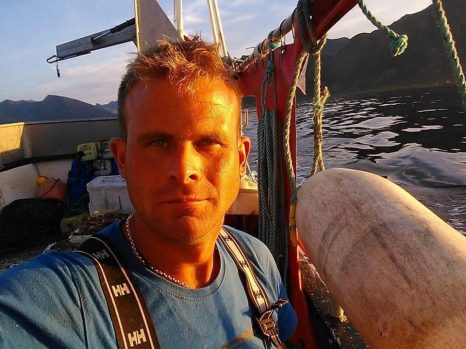
‘Don’t worry, I can do it’ – Tragic final words of experienced fisherman who drowned at sea
A Fisherman with ten years experience downed at sea while trying to untangle a line after telling crew members “don’t worry I can do it”. Darren Brown was swept away while trying to pull free a whelk pot and his body was never found, despite an eight-hour search by lifeboats and a coastguard helicopter. The 37-year-old was lost in the 13C waters in June. A report into his death found a lifebuoy which could have helped to save his life was not “readily available”. On June 9 this year, deckhand Darren and his crewmates were on board the whelk boat, ‘Our Sarah Jane’, which had set sail from Shoreham, West Sussex, in good conditions. Just before midday a fishing line attached to one of the whelk pots became caught in the propeller, tying the boat to the seabed. The skipper radioed for help, but Darren said “I’ll be alright. I can do it, don’t worry” before jumping overboard with a knife in his hand. Read the rest of the story here 14:20
Banana Republic of Mexico and Sea Shepherds Round Up Fishermen to “save” the critically endangered Vaquita
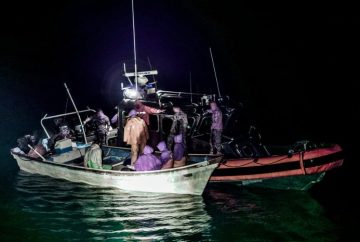 Crew from six fishing boats in Mexico’s Sea of Cortez were arrested by the Mexican Navy, after they were caught using illegal fishing nets to poach banned fish in a marine reserve. The fishermen had been spotted by the Sea Shepherd
Crew from six fishing boats in Mexico’s Sea of Cortez were arrested by the Mexican Navy, after they were caught using illegal fishing nets to poach banned fish in a marine reserve. The fishermen had been spotted by the Sea Shepherd vessel scow Farley Mowat, which tracked the six boats until navy officials could arrive on the scene. According to Sea Shepherd, a nonprofit marine wildlife organization, the fishermen were using banned gill nets to catch totoaba bass, a rare fish Mexican law has protected since 1975 but one that is nonetheless poached for its swim bladders, which, at an estimated US$20,000 per kilo, fetch a high price on China’s black market. The fishing boats were stopped and their crews apprehended without incident. Read the story here 12:25
Governor John Bel Edwards Appoints Jack Montoucet as Louisiana Department of Wildlife and Fisheries Chief
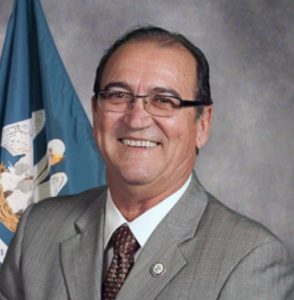 Acadiana lawmaker Jack Montoucet has been appointed secretary of the Louisiana Department of Wildlife and Fisheries by Gov. John Bel Edwards. Montoucet, 69, represents District 42 in the statehouse, which includes Acadia and Lafayette parishes. He has been a fierce ally of Edwards in the House. He officially takes over Jan. 16. Patrick Banks, assistant secretary of the office of fisheries, will serve as interim secretary until then. Montoucet will replace former Secretary Charlie Melancon, who was forced out by the administration. Melancon, a former congressman, clashed with recreational fishermen and U.S. Rep. Garret Graves, R-Baton Rouge, over fisheries management since taking over as secretary. He also had a fractious relationship with some lawmakers for changes within the agency. Read the story here 11:23
Acadiana lawmaker Jack Montoucet has been appointed secretary of the Louisiana Department of Wildlife and Fisheries by Gov. John Bel Edwards. Montoucet, 69, represents District 42 in the statehouse, which includes Acadia and Lafayette parishes. He has been a fierce ally of Edwards in the House. He officially takes over Jan. 16. Patrick Banks, assistant secretary of the office of fisheries, will serve as interim secretary until then. Montoucet will replace former Secretary Charlie Melancon, who was forced out by the administration. Melancon, a former congressman, clashed with recreational fishermen and U.S. Rep. Garret Graves, R-Baton Rouge, over fisheries management since taking over as secretary. He also had a fractious relationship with some lawmakers for changes within the agency. Read the story here 11:23
FISH-NL presents certification application to Labour Relations Board
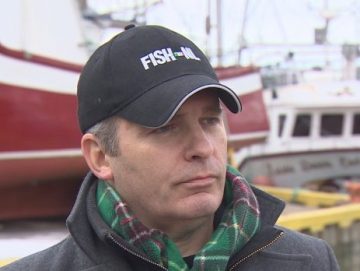 The Federation of Independent Sea Harvesters of Newfoundland and Labrador (FISH NL) presented an application this morning to the Labour Relations Board requesting that the organization be certified as the new bargaining agent for inshore fish harvesters. The application includes membership cards signed by thousands of harvesters from more than 300 communities around the province. “We feel we have the support of more than 50 per cent of all inshore harvesters — we certainly had the support of more than 80 per cent of all harvesters we encountered,” said Ryan Cleary, President of FISH-NL. “What we’re attempting has been described — not as a raid of another union — but as a full fledged revolt.” Over the coming days and weeks, the Labour Relations Board will review FISH-NL’s application and verify the membership cards. The Board will determine whether FISH-NL has the support of at least 40 per cent of fish harvesters, which would trigger a secret ballot vote by the Labour Relations Board. That vote will ultimately decide which union will represent fish harvesters. 10:28
The Federation of Independent Sea Harvesters of Newfoundland and Labrador (FISH NL) presented an application this morning to the Labour Relations Board requesting that the organization be certified as the new bargaining agent for inshore fish harvesters. The application includes membership cards signed by thousands of harvesters from more than 300 communities around the province. “We feel we have the support of more than 50 per cent of all inshore harvesters — we certainly had the support of more than 80 per cent of all harvesters we encountered,” said Ryan Cleary, President of FISH-NL. “What we’re attempting has been described — not as a raid of another union — but as a full fledged revolt.” Over the coming days and weeks, the Labour Relations Board will review FISH-NL’s application and verify the membership cards. The Board will determine whether FISH-NL has the support of at least 40 per cent of fish harvesters, which would trigger a secret ballot vote by the Labour Relations Board. That vote will ultimately decide which union will represent fish harvesters. 10:28
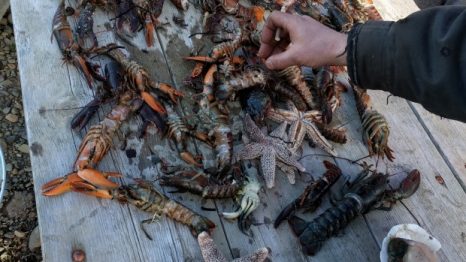
Scientists test water to narrow down what’s killing herring, sea creatures at St. Marys Bay
Federal scientists are testing water samples and scanning images of the bottom of St. Marys Bay, hoping to determine what caused thousands of herring and sea creatures to wash ashore near Digby, N.S. Staff aboard a vessel gathered samples Thursday and used an underwater camera to film and photograph the ocean floor. Kent Smedbol, manager of population ecology for the Department of Fisheries and Oceans (DFO) in the Maritimes, said the data will be examined to try to figure out whether an environmental factor caused the fish to die. “It could be an intrusion of very cold water very rapidly, it could be related to a rapid change in salinity with the storms that have gone through … due to the sudden influx of fresh water, rain or runoff from the land,” he said. “Depending on what we find, then hopefully that will allow us to discount a number of possibilities and focus our efforts on some possible explanations.” Read the story here 08:55
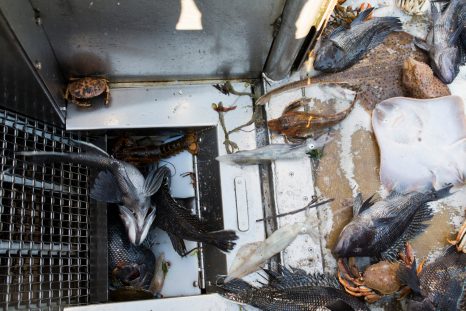
Fish Seek Cooler Waters, Leaving Some Fishermen’s Nets Empty
Studies have found that two-thirds of marine species in the Northeast United States have shifted or extended their range as a result of ocean warming, migrating northward or outward into deeper and cooler water. Lobster, once a staple in southern New England, have decamped to Maine. Yet fishing regulations, which among other things set legal catch limits for fishermen and are often based on where fish have been most abundant in the past, have failed to keep up with these geographical changes. Reflecting these tensions, Senators Richard Blumenthal and Christopher S. Murphy, both Democrats of Connecticut, noted in a letter to the acting inspector general of the Commerce Department in June that fishermen in their state were experiencing “extreme financial hardship” because the apportionment of resources was so outdated. Although such shifts in allocations are possible, said Tom Nies, the executive director of the New England Fishery Management Council, in practice they are difficult to execute. “If you’re giving fish to somebody, you’re taking them away from somebody else,” Mr. Nies said. Read the article here 08:03






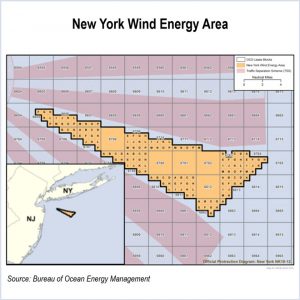 Could sea scallops and longfin squid be reason enough to stop an offshore wind farm on the coast of New York and New Jersey? The Fisheries Survival Fund, which represents the majority of the U.S. Atlantic scallop industry, claims the site picked for the farm is on documented fishing grounds for both commercially important species. It claims the wind turbines would shut fishermen out. The group is the lead plaintiff in a federal lawsuit filed against the Bureau of Ocean Energy Management (BOEM) and Sally Jewell, the secretary of the U.S. Department of the Interior. The BOEM has jurisdiction over the sea floor. Other plaintiffs include the Garden State Seafood Association, the Fishermen’s Dock Co-Operative in Point Pleasant Beach and the Borough of Barnegat Light.
Could sea scallops and longfin squid be reason enough to stop an offshore wind farm on the coast of New York and New Jersey? The Fisheries Survival Fund, which represents the majority of the U.S. Atlantic scallop industry, claims the site picked for the farm is on documented fishing grounds for both commercially important species. It claims the wind turbines would shut fishermen out. The group is the lead plaintiff in a federal lawsuit filed against the Bureau of Ocean Energy Management (BOEM) and Sally Jewell, the secretary of the U.S. Department of the Interior. The BOEM has jurisdiction over the sea floor. Other plaintiffs include the Garden State Seafood Association, the Fishermen’s Dock Co-Operative in Point Pleasant Beach and the Borough of Barnegat Light. 


























